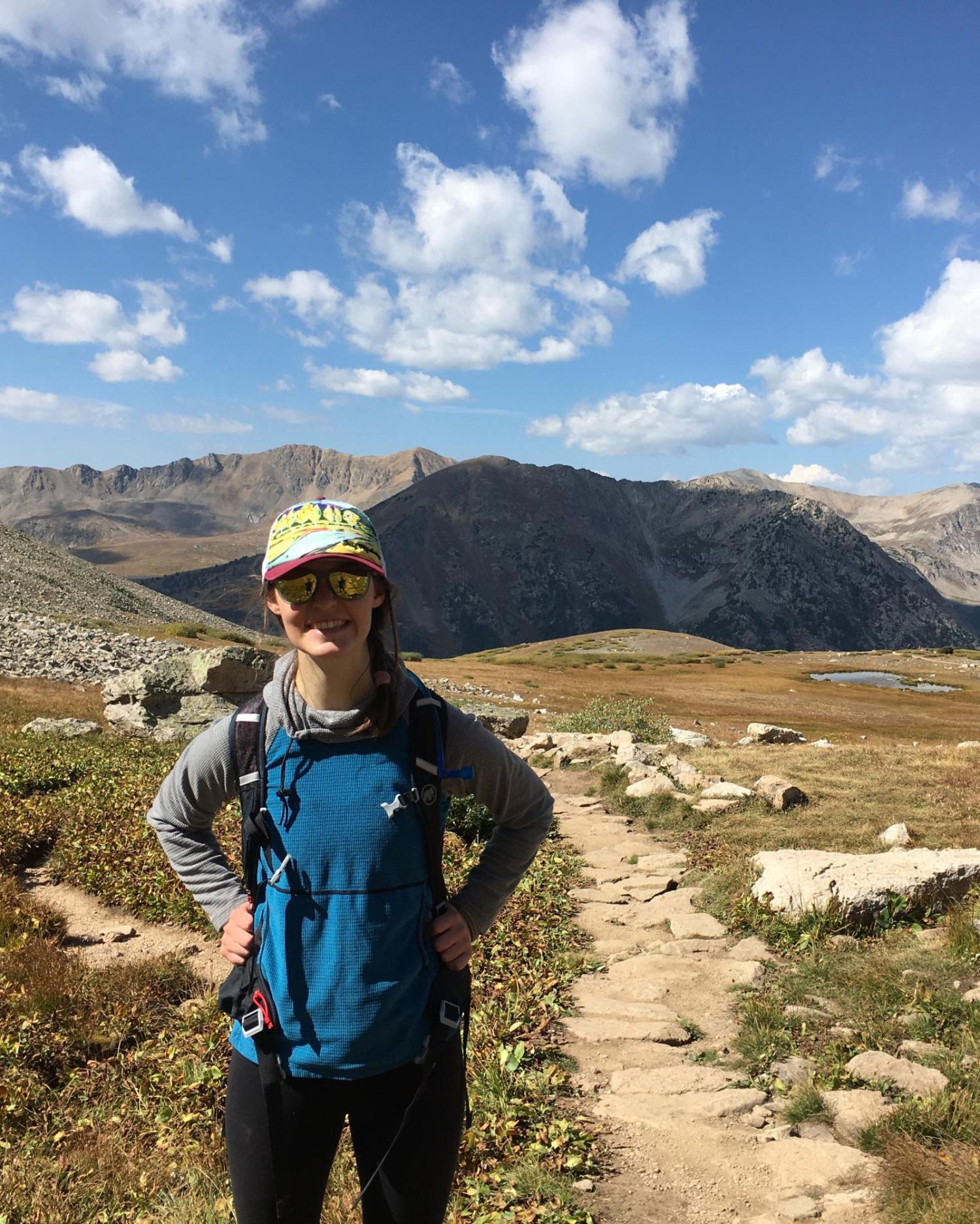Meet the winners of the 2023 Buffs One Read Storytelling Contest
Three undergraduate students will each receive a prize of $500 for their winning essays in the University Libraries Buffs One Read Storytelling Contest.
The winners are: Taj Dehart for the essay “Lost and Found,” Livia Follet for the essay “Under the Angel: Writing in Reciprocity” and Emily Reynolds for the essay “Rewriting the Scorched Path: The Power of Communal Storytelling.”
The contest invited CU Boulder undergraduate students to submit creative expressions based on this year’s Buffs One Read selection, Braiding Sweetgrass: Indigenous Wisdom, Scientific Knowledge and the Teaching of Plants by Robin Wall Kimmerer, and their reciprocal relationship with the more-than-human world.
“We had numerous compelling, creative and stunning submissions,” said Caroline Sinkinson, Learning & Engagement team lead and a judge for the contest. “Taj DeHart, Livia Follet and Emily Reynolds in particular stood out to the judges because of their skillful narration in describing their connection to Braiding Sweetgrass and its impact on how they view the natural world.”
Explore all of this year’s Buffs One Read Contest submissions.
Meet the winners:

Taj Dehart
“I have a deep passion for environmentalism and for reading and writing. I'm really proud that this seemed to come out in my writing."
Taj Dehart is a senior studying physics at CU Boulder and is currently taking the year off. He is originally from Virginia, but grew up in China and Malaysia.
“I've used a lot of my new found free time this year to reflect on my connection to the environment and my relationship with technology, both of which I've been frustrated with,” said Dehart. Dehart’s essay, “Lost and Found,” is about losing his relationship with nature and his journey to reestablish it on the Appalachian Trail.
“During this time, I have also had the opportunity to start reading again, including ‘Braiding Sweetgrass’, and to travel back home to Virginia to hike and see family friends.” Dehart continued, “this prompt seemed like a perfect outlet for some of these pent-up feelings.”
In the essay, Dehart describes growing up in Orlean, Virginia, a rural town of fewer than 1000 people surrounded by the forest and nature. “I have a deep passion for environmentalism and for reading and writing. I'm really proud that this seemed to come out in my writing—I'm going to take that as a sign that I should try to sink my teeth into storytelling, nature and hopefully combining the two.”
Despite his formative experiences, reconnecting with nature remains challenging, a theme which he touches on in his essay. “Looking at the state of biodiversity and the environment depresses me, and I'm also so distracted a lot of the time that deeply connecting with nature is hard, even when I'm outside,” Dehart explains. “Meditation has helped me deal with those strong emotions and helped me focus on my surroundings. I try to meditate when I wake up and before I go to bed.”
Dehart’s essay was selected due to how he “skillfully narrates his loss and recovery of a deep friendship with nature.”
Livia Follet
“Kimmerer's writing provides a lens into spaces that allow us to imagine what the world might look like if we sought to better our relationship with the natural world.”
Livia Follet is a senior majoring in English and women and gender studies. She is from Salida, Colorado.
“I really wanted to tell a story about my connection to home and place,” said Follet. “Robin Wall Kimmerer's words instilled a certain place-based knowledge that I found to be healing.”
Follet’s essay, “Under the Angel: Writing in Reciprocity,” centers on her hometown of Salida and the "Angel of Shavano", a mountain snow feature in the shape of an angel and subject of legend for the indigenous Ute people.
“When I read [Kimmer’s work], I think of the river and mountains I call home and how grateful I am to know them. My story ties together the Angel of Shavano and the importance of the stories that tie us to place.”
In the essay, Follet describes how meaningful it was to read “Braiding Sweetgrass” and how she shared it with friends throughout the country. “My book is filled with notes and annotations from my friends and in that way it has become its own special piece of art.”
Follet said that writing the essay for the contest was therapeutic. “I'm actually writing the second half of my English honors thesis on ‘Braiding Sweetgrass.’ At this point, the book has become a second home to me.”
For Follet, reading and writing help her stay connected to nature. “Kimmerer's writing provides a lens into spaces that allow us to imagine what the world might look like if we sought to better our relationship with the natural world.” Follet reflects, “it's especially important because outdoor spaces are not accessible for a lot of people. Books serve as this window into other worlds. They provide an intense sense of hope that is essential for surviving in the midst of an anthropogenic climate crisis. In that way, writing is so important in solidifying that relationship because it allows us to ponder inward while at the same time considering a more-than-human world.”
Follet’s essay was selected because as one judge noted, “it demonstrates the power of place through its description of the writer's childhood home, and the writer's decision to share Kimmerer's book with friends is a great illustration of the power of shared stories to spark broader conversations.”


Emily Reynolds
At its simplest, this story exists because I feel a deep responsibility to be a good steward of the stories which are not my own, but which have been generously shared with me, and I'm so grateful for other readers who are willing to engage with these stories with me.”
Emily Reynolds will graduate this spring with majors in anthropology and linguistics, a Spanish minor and a writing certificate. She will return to CU Boulder in the fall to continue earning a master's degree. She grew up in Cañon City, Colorado.
“The story I shared only exists because of the stories of others,” said Reynolds. Reynolds’ essay, “Rewriting the Scorched Path: The Power of Communal Storytelling,” is about the impact of the Marshall Fire, a fire that, in December 2021, swept through Boulder County becoming the most destructive in Colorado history.
Reynolds is a student researcher for the Marshall Fire Story Project and collects oral and written stories to create a community archive of experiences of the fire.
“I happened to be hearing all of these stories around the same time [as the Buffs One Read],” Reynolds explained. “They shared a common thread of describing how we struggle to navigate our relationship with the environment in the context of climate change. I was profoundly impacted by this narrative, and it was impossible for me not to put these disparate storytellers in concert with one another—I remember telling my partner at one point that I didn't even care if anyone ever read my story, I just needed it to exist. It felt deeply cathartic to finally have it all down in one place, and to know that I had engaged meaningfully with some of the most powerful stories I've ever heard. At its simplest, this story exists because I feel a deep responsibility to be a good steward of the stories which are not my own, but which have been generously shared with me, and I'm so grateful for other readers who are willing to engage with these stories with me.”
Reynolds said that one of her New Year’s resolutions was to write more and submitting to the contest helped her meet that goal. “I set a goal to write more because I often dismiss the power of written reflection,” Reynolds said. “The experience of writing this piece reminded me that there's value in transforming thoughts into a text that can be referenced, amended and shared with others.”
In order to connect with nature, Reynolds said she tries to stay highly engaged. “One of my favorite ways to connect with nature is to allow myself to dive unabashedly into my own curiosity. I love to explore what makes different species unique and how they fit together to form a larger community of organisms. I grew up understanding 'connection' with nature as silent, sterile and serene, but I know now that it can also be exhilarating, and taking this perspective has brought so much joy, novelty and awe to my life.”
Reynolds’ essay was selected because of its “complex of ambivalent feelings toward the wind in the wake of the Marshal Fire” and like the stories she heard from victims of the fire, “ends with gratitude for the power of communion.”

